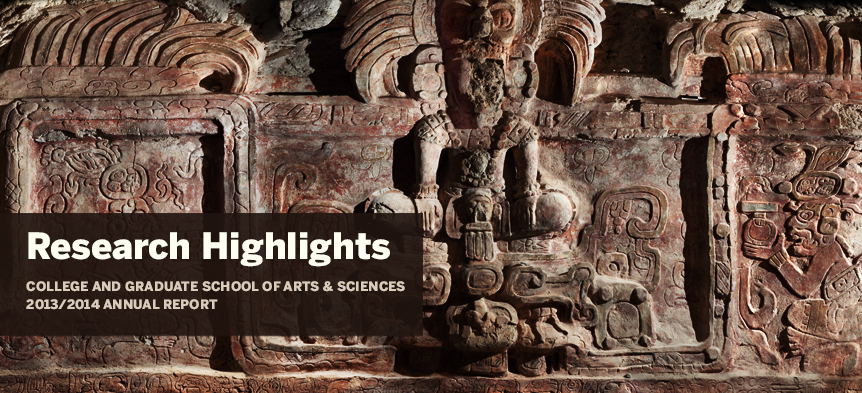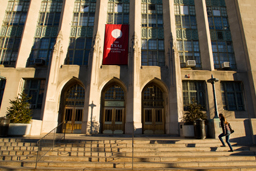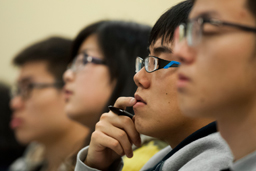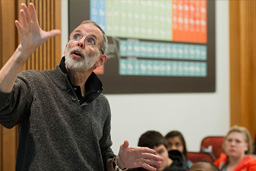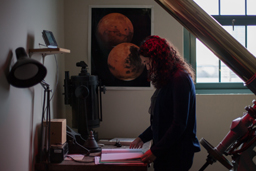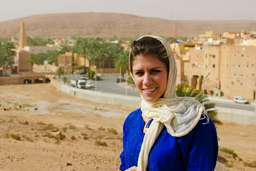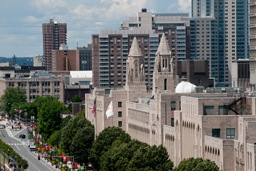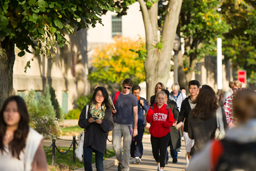The following is a sampling of CAS faculty members’ outstanding research accomplishments during AY 2013/14.
Archaeology
In October 2013, a new cave complex containing a previously undiscovered population of early human ancestors was uncovered in the Cradle of Humankind World Heritage site in South Africa. The hundreds of fossils already recovered from this Rising Star Cave (and the hundreds more remaining to be excavated) are expected to revolutionize scientific thinking about the origins of the human genus. CAS Professor of Archaeology Jeremy DeSilva, one of the world’s leading experts on the early evolution of the human foot, was a key participant in the Rising Star project.
A beautifully decorated polychrome-painted stucco frieze was unearthed by CAS Research Assistant Professor of Archaeology Francisco Estrada-Belli’s team at the site of Holmul, a Classic Maya city in the northeastern Petén region of Guatemala. The discovery was made as the team excavated a tunnel left open by looters. The remarkably well-preserved carving depicts human figures in a mythological setting, suggesting these may be deified rulers. The team, which included BU recent alumna Anya Shetler (CAS’12), made the discovery in the foundations of a Maya pyramid on the site. Read more
Chemistry
This past year, BU Today and Bostonia magazine published a four-article series exploring the work of Mark Grinstaff, a CAS professor of chemistry, and his colleagues in the Grinstaff Group. The lab, which consists of over 20 graduate students and postdoctoral fellows, attracts members of varied expertise—including chemistry, pharmacology, and biomedical mechanical engineering. The Grinstaff Group is working on three key projects: a team focused on treating early-stage lung cancer by designing chemotherapy-releasing films that can be stapled along lung tissue where a tumor has been removed; a mesothelioma group creating chemotherapy-releasing nanoparticles that are absorbed by and expand within late-stage tumor cells; and an osteoarthritis group researching better ways to diagnose and treat damaged cartilage tissue.
A study co-authored by Professor of Chemistry John Porco, along with collaborators at the Whitehead Institute, has clarified how a naturally occurring anticancer molecule helps to fight tumor growth. The researchers found that rocaglamide A, an inhibitor of translation initiation, is a strong inhibitor of Heat Shock Factor 1 (HSF1) activation. HSF1 inhibitors have received significant attention for their potential role in the rapid development of anticancer drugs with completely new modes of action. Read more
In the past year, the National Science Foundation has awarded new funds to no less than 6 different research groups in Chemistry, including projects on excited state dynamics in condensed phase systems; a computational study to develop a fundamental understanding of the nature and potential applications of protein encapsulation in micelles; a project to develop new C-X bond forming reactions with the earth-abundant metal copper; and a project to develop an environmentally friendly continuous oil recovery device based on a new, biodegradable, safe, and highly tunable poly(glycerol carbonate) mesh.
Earth & Environment
A study coauthored by BU Professor of Earth & Environment Ranga Myneni suggests the southern portion of the Amazon rain forest is at a much higher than previously expected risk of dieback—the widespread death of forest species—due to climate change. If severe enough, the loss of rain forest could cause the release of large volumes of the greenhouse gas carbon dioxide into the atmosphere. It could also disrupt plant and animal communities in one of the most biodiverse regions in the world. Read more
Economics
Our economics faculty continue to be highly cited. As reported in a January article by BU Today, four CAS faculty are ranked in the top 1% in the world in terms of citations according to Research Papers in Economics. The department’s two most senior female faculty, Marianne Baxter and Claudia Olivetti, are both among the most cited female economists in the world.
English
Gene Jarrett, professor of English and African American studies, received a fellowship for full professors from the American Council of Learned Societies. The ACLS Fellowship is granted to professors in all disciplines of the humanities and related social sciences with the goal of developing a major piece of scholarly work, allowing them to devote 6 to 12 continuous months to full-time research and writing. Professor Jarrett will complete writing a definitive biography of Paul Laurence Dunbar (1872–1906), the first African American author born after slavery to gain international recognition.
History
Professor of History Diana Wylie spent the 2013/14 academic year as a Senior Fulbright Research Scholar in Morocco. Since 2010, she had visited the neighboring country of Algeria four times, primarily to research the work of a historic preservation movement in the city of Oran. This year, she took this research interest to three cities in Morocco: Casablanca, Tangier, and Meknes. She investigated historic preservation in these cities, looking at what sites are being preserved and what meaning they have for local people. She aims to illuminate the question of what should be preserved and why.
International Relations
Associate Professor of International Relations Thomas Berger’s most recent book, War, Guilt, and World Politics After World War II, was named one of the best political and international relations books of 2013 by foreign relations council Foreign Affairs. Read more
Linguistics
Assistant Professor of Spanish and Linguistics Danny Erker has begun a pilot study in Boston to try to understand how Spanish is used in social contexts in large urban settings and how the language may be changing. Read more
Political Science
Professor of Political Science Cathie Jo Martin was awarded the J. David Greenstone annual prize by the Politics and History section of the American Political Science Association (APSA) for her book with Duane Swank, The Political Construction of Business Interests. The prize recognizes the best book in history and politics in the past two calendar years. Read more. Martin also co-chaired an APSA task force to try to understand why Congress is so bad at negotiating compromise. The crux of the group’s findings, presented to Congress in December, was that US political institutions work against meaningful dialogue and compromise. Read more
